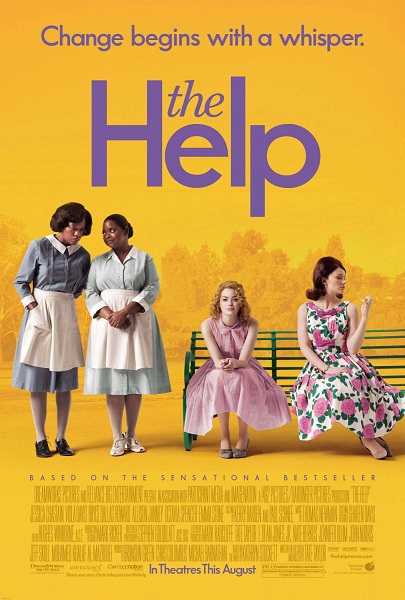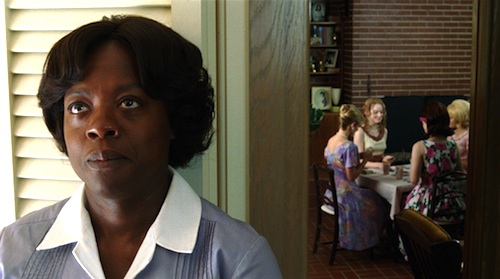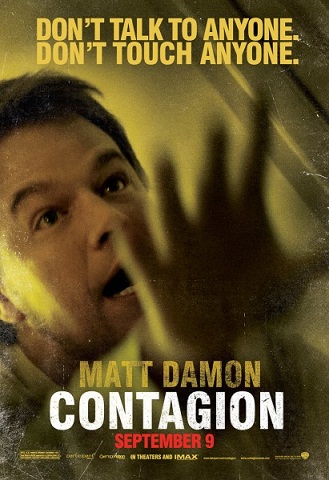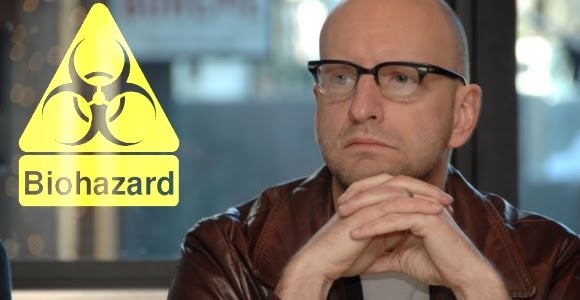"The Help" and "Contagion"
The Help

[warning: *spoilers spoilers spoilers*]
Based on Kathryn Stockett's novel, "The Help" contains some scenes of tremendous emotional power and very painful truth, and others that seem to exist to pop a Lifetime-movie bow on top of the story. It gives us two brave characters: a young, slightly unconventional white woman named Skeeter (Emma Stone) and a middle-aged black maid, Abilene (Viola Davis) who risks everything in the Jackson, Mississippi of 1962 when she agrees to tell Skeeter her story. Skeeter is an aspiring writer, and she has an idea for a book: let's hear from the people who are invisible, whose stories we never get to hear. And the question is, does the movie itself do justice to those stories, those lives? I don't think it does, but there are still reasons so see this.
What interests Skeeter is the dynamic whereby black women raise white women like herself and her friends: love them, give them their sense of self-esteem--give them everything, really--and then these women grow up to become the boss, and by the time they're 20 they're as callous as their parents. Alone amongst her social set, Skeeter was never willing or able to make that leap. She enlists Abilene and, eventually, sassy Minny (Octavia Spencer).
Also alone amongst her group of well-to-do girlfriends, led by Hilly (Bryce Dallas Howard), Skeeter is more interested in a career as a writer than in finding a man and being a housewife. She find herself more and more at odds with Hilly, who, in the first stirrings of the civil rights era, has decided that it's not sanitary to allow the help to use the family toilet: she numbers each piece of toilet paper, and she leads a public movement to get all her friends to build adjacent bathrooms--outhouses, really--for the blacks.
It's such a weird dynamic: you need to have a black around to do all the things you don't want to do yourself, but at the same time you view them as unclean things. Dirty, and yet they are not only allowed but expected to have intimate relations with your children. (At one point a white baby strokes Abilene's cheeks as if in wonder at her dark skin, and then tells her, "You're my real mommy.") Moving through their stately manors and plantation porches, these southern gentry are a bit like the aristocracy in Europe at the moment when their historical age is coming to an end. The past and the present co-exist, one atop the other in constant interplay. The landscape is still that of the slave era: there are swooping aerial shots of the sweeping cotton fields. (Skeeter calls her editor in New York and we glimpse a whole other world, a bit of the world of "Mad Men").

The performances make the film. It's brilliantly cast. Viola Davis conveys so much with her eyes, the way they go flat when the white women engage in humiliating talk while she serves them. As the villain of the piece, Bryce Dallas Howard conveys a kind of smiling cruelty all the more sinister for springing from an ideology of gentility and propriety. (Speaking of films about race relations in America, I really liked her in "Manderlay", Lars Von Trier's provocation (and a film at the opposite end of the cultural spectrum from "The Help"); I'll never forget the scene where the camera keeps pulling away from the naked Howard as she writhes while touching herself, sinking to the bottom of a sea of chiaroscuro, lost in the depths, the throes of her own awakened sexuality).
Jessica Chastain plays a sweet ditz not to the manor born, who has been elevated to the social level of Skeeter's peers by marrying a man in that circle; she instinctively treats Minny as a human being. As for Emma Stone, I hadn't seen her in anything else but by the end of this I was smitten. I like the way her smile causes her eyes to shut. I also really liked Allison Janney as Skeeter's mother, a respected pillar of the community, basically good-hearted and wise, but afflicted with cowardice and a concern for social standing that leads to a heartbreaking scene where she fires the family's elderly maid, Constantine, to save face with the luncheoning Daughters of the American Revolution when Constantine's daughter refuses to use the back door. The eyes of Janney as she banishes Constantine plead silently, as all those years of love and service are repaid with betrayal.
What comes through is the sense of one indignity, one humiliation after another. I think of the scene where Abilene and all the other African-Americans are thrown off the bus in the wake of what turns out to have been the assassination of Medgar Evers. She is forced to rush home through the bad part of town in the night, and at one point she falls. To see this solid, dignified woman slip and fall in the mud is truly painful. And there is a scene near the end where Hilly forces her weak-willed friend to fire Abilene. Abilene finally summons the courage to talk back to a white woman, her voice shaking with the effort of flouting everything she's ever been taught. It is an exhilarating moment. And she concludes her remarks by saying something that struck me. Instead of calling her persecutor every name in the book, she says, simply, "Ain't you tired, Miss Hilly? Ain't you tired?" This moment seemed to me so evocative of the strategy of the civil rights movement, its "satyagraha": it alerted white people to the psychic cost to themselves of their own racism. With moments of truth and bravery like that, it's too bad that the picture so often goes places that are not true to the animating idea of showing the pain of these women's lives (including a lot of comic business involving a pie with a secret ingredient that Minny tricks Hilly into eating).
Rating: ***
Key to ratings:
***** (essential viewing)
**** (excellent)
*** (worth a look)
** (forgettable)
* (rubbish!!)
Contagion


[warning: *spoilers spoilers spoilers*]
This is Soderbergh, so you go in with the basic expectation of high-quality filmmaking. (In an auteurist-flummoxing career, that's perhaps the one thing you can expect going in.) I've followed him ever since I saw "Sex, Lies and Videotape" at the theater in 1989, which seemed at the time to define a new movement of American independent film. He has worked in many styles since then: he makes star-studded entertainments like the Ocean pictures, where he's having a laugh with his movie-star friends. Then he makes experimental films, sometimes yielding fascinating results ("The Girlfriend Experience" starring Sasha Grey, a porn star who digs Jean-Luc Godard). (I realize after writing that line that I've just described my ideal girlfriend. Only kidding, folks!!). And then there are the ones that have meant the most to me, works like "The Limey" and "Out of Sight": genre pictures, but such expressive, lyrical ones, more or less mainstream but steeped in the boundary-defying spirit of 70s cinema. They're also unexpected fonts of emotion.
"Contagion" finds him in "Traffic" mode: multiple narratives, ensemble movie-star cast. What we have here are scenes from an epidemic of a new plague, an unknown, lethal, incurable virus, but what it's really about is human intelligence versus hysteria and irrationality. (Whenever someone coughed, it reminded me of the lunchroom in my old office and the lady who, like an augur of old, would comment portentously with every hack heard, "That was the outbreak. " And in fact the movie does make you self-conscious about touching your face.)
Gwyneth Paltrow picks up the bug in Hong Kong. She brings it back home, to her children and hubby Matt Damon. It spreads exponentially. Jennifer Ehle is a doctor trying to invent a cure, Marion Cotillard is handling the outbreak in rural China when she is forced to put human faces to her statistics. Kate Winslet is an agent trying to stem the tide, working under the auspices of Laurence Fishburne. Jude Law plays a conspiracy-theorist blogger railing against government. One gets the impression that each story strand has been tightly edited, that there was enough material here to make a series. It would be interesting to see how it would work as a TV series, given that amount of time.
Leaving the theater, my verdict was that "Contagion" was absorbing, adult, non-exploitative, but never riveting, filmmaking. Perhaps Soderberh hasn't quite dramatized this material sufficiently, I thought. For a thriller, there's something bloodless and detached about it. The performances are all quite understated as well. But over the days it stayed with me. That's when I know that a film has gotten under my skin, when I'm still thinking about it days later. I think it was the very plausibility of it that struck me, the way it chonicled societal breakdown as desperation and paranoia strike deep. For another thing, without giving away too much, "Contagion" is quite willing to break Hollywood taboos about who can and cannot be stricken down. And finally, I saw it right around the 10th anniversay of 9/11 and it seemed to resonate with that on a number of levels.
In the end it's a very hopeful picture. Faced with something intractable, we needn't fall apart: we can pull together and, with our intelligence, sort it out. We see selfishness and opportunism and profiteering in this movie, but much more sacrifice and selflessness. In the final scene Damon stages a personal prom in the living room for his teenage daughter and her boyfriend. As she puts on U2's "All I Want Is You" and awaits her boyfriend, Damon sits in the next room looking at pictures of his wife on his phone. As the girl and her boyfriend dance, Damon finally gets to mourn what's been lost: not just this person whom he loved, but his image of her as well. (Without giving too much away, it turned out she wasn't who he thought she was.) They are survivors, and life goes on. Even if no individual scene rocked me on my foundations, "Contagion" haunts me still.
Rating: ****
-- September 22, 2011
Key to ratings:
***** (essential viewing)
**** (excellent)
*** (worth a look)
** (forgettable)
* (rubbish!!)



 Scott Pfeiffer
Scott Pfeiffer
Reader Comments